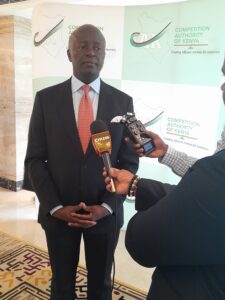
The National Council of Churches of Kenya (NCCK) held a two-day forum to review the prevalence, trends and impact of Non Communicable Diseases (NCD) among adolescents.
The forum which was held at Jumuia place Limuru, brought together Chairpersons of
County Coordinating Committees, NCCK representatives on County Education Boards, Church Education Secretaries, Secondary School Principals, NCD survivors and other stakeholders in the education sector. The participants were drawn from Kakamega, Kisumu, Uasin Gishu, Nakuru, Nyeri, Meru, Kiambu, Kitui, Mombasa and Nairobi counties.
NCCK reflected on the role of diet on emergence and management of Non Communicable Diseases, and were inspired by the scripture recorded in Genesis 9: 3
Everything that lives and moves will be food for you. Just as I gave you the green plants,
I now give you everything.
Prevalence of NCDs Among Adolescents
We have noted with deep concern the rising trend of adolescents contracting Non Communicable Diseases. It is saddening that the probability of a young person dying early from an NCD stands at just over 18percent.
Statistics from the Kenya Adolescent Health Survey of 2020 indicated that 1.4 percent
were diagnosed with high blood pressure, 0.9% with asthma, 0.6% with cancer, 0.4% with diabetes, and 26.8% with sickle cell. This means that NCDs are now a major health concern for all school learners.
Appreciably, healthy eating plays a very key role in managing these conditions.
Unhealthy Meals in Schools
We are deeply dismayed that learners in schools are not served nutritionally balanced food at every meal. The reasons for this state of affairs include high cost of foodstuffs, weak implementation of existing laws and guidelines on nutrition, and ignorance-driven attitude that focuses on filling the stomach rather than nutritional value. Cultural practices and beliefs also affect the foods that are served to learners by schools. On its part, the government bears responsibility since the capitation for students does not include meals.
Further to these, there is a glaring lack of systems and structures to oversee procurement of foodstuffs for schools. It is notable that both the Boards of Management and County Education Boards do not have a spelt out mandate to oversight the food served in schools, with the responsibility ostensibly being hidden under the provision on “student welfare”. As such, the
procurement of food in a school is wholly dependent on the principal, who may or may not form a committee to work with.
The lack of quality control of foods procured for learners in schools is a great exposure that could spike the prevalence of NCDs among adolescents.
Strategies for Nutritionally Balanced Meals in Schools to remedy this situation, NCCK made the following recommendations:
a) To the Government
Calls upon the government to make a deliberate decision to focus on the nutritional value of the meals served to learners in schools. The health of the learners should invite as much attention
as the learners’ presence in the school.
Towards this, we urge that nutritionists be appointed at the subcounty level with mandates to work with schools to ensure that they serve food to learners that is healthy and relevant to socialcultural settings. There may be need for collaboration between the Ministries of Health and
Education on this undertaking.
We further urge that the government displays this concern for the welfare of the learners by expanding the school feeding programme to all schools.
In addition, we strongly recommend that NCD risk factors reduction and controls are included in the school curriculum as part of skill building.
b) To County Education Boards
We encourage all the County Education Boards to include monitoring of the health status of learners as a standing agenda. This will enable them track the trends on prevalence of Non Communicable Diseases and other health conditions and to proactively take remedial actions.
c) To School Boards of Management
As the immediate caretakers of learners, we challenge all School Boards of Management to adopt the procurement of food and composition of meals served in their schools as key focus areas. It should be an agenda in every Board meeting. This will enable the Board to adequately support the Principal in ensuring foods procured and meals served are of the right quality and composition. On their part, we encourage the Principals to embrace stakeholder engagement in the procurement and composition of foods served to the learners.
d) To Parents and Communities
Recognizably, healthy eating is a practice that one learns at home. There have been reported cases where learners demand unhealthy foods from the school leadership. We therefore challenge all parents to inculcate healthy eating habits in children from the time they are weaned. Secondly, we call upon all parents to educate their children on the nature and risk factors
surrounding Non Communicable Diseases. Let us all overcome the fear and stigma on NCDs so that we protect each other.
5. Our Commitment
On our part, we have committed to use our platforms, especially the pulpit, to promote healthy eating and to create widespread knowledge on Non Communicable Diseases. We are also working to promote development and implementation of policies aimed at streamlining the procurement of food in all schools.
6. Conclusion
In conclusion, we reiterate that management and control of Non Communicable Diseases is very expensive on the individual, the society and the government. It is imperative on all of us to promote healthy eating as one of the strategies in risk factor reduction. We remain committed to supporting all learners access adequate food of appropriate quality.


















